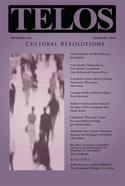Ten characteristics of the patterns of ethnic conflict in Europe—the way they are reflected in media and culture. They serve as the key to conceptual understanding of the nature of confrontation, aggression in communication in the public sphere in Europe at present, and erosion of democratic values
|
Jens-Martin Eriksen’s “Culturalism: When the Culture becomes Political Ideology” appears in Telos 163 (Summer 2013). Read the full version online at the Telos Online website, or purchase a print copy of the issue in our store. Eriksen and Stjernfelt’s The Democratic Contradictions of Multiculturalism is also available here. |
||||
|
Telos Press Publishing · PO Box 811 · Candor, NY 13743 · Phone: 212-228-6479 Privacy Policy · Data Protection Copyright © 2024 Telos Press Publishing · All Rights Reserved |
||||
 The political critique of modernity has gained momentum in Europe in recent years. It is a diverse movement, encompassing populist nationalist and national-conservative parties in Western Europe, a fascistoid Christian-nationalist revival—and on the opposite side: Islamism and the people they instrumentalize, the multiculturalists. They all agree that politics should focus primarily on culture and religion, and all other fields of operation depend on these aspects being stable and undisturbed and not influenced by other trends in society. The dogma that individuals from different groups should not mix is widely accepted and a de facto apartheid is more or less implemented in Western Europe by the civil society. The physical segregation in the cities and in public schools is a fact. The political power play is for the moment over signs and political symbols—e.g., the referendum in Switzerland about the prohibition of minarets, the ban on religions symbols in public schools in France, and other initiatives. The Left seems dazed and confused in this battle and unable to calibrate how to meet the challenge.
The political critique of modernity has gained momentum in Europe in recent years. It is a diverse movement, encompassing populist nationalist and national-conservative parties in Western Europe, a fascistoid Christian-nationalist revival—and on the opposite side: Islamism and the people they instrumentalize, the multiculturalists. They all agree that politics should focus primarily on culture and religion, and all other fields of operation depend on these aspects being stable and undisturbed and not influenced by other trends in society. The dogma that individuals from different groups should not mix is widely accepted and a de facto apartheid is more or less implemented in Western Europe by the civil society. The physical segregation in the cities and in public schools is a fact. The political power play is for the moment over signs and political symbols—e.g., the referendum in Switzerland about the prohibition of minarets, the ban on religions symbols in public schools in France, and other initiatives. The Left seems dazed and confused in this battle and unable to calibrate how to meet the challenge. 






